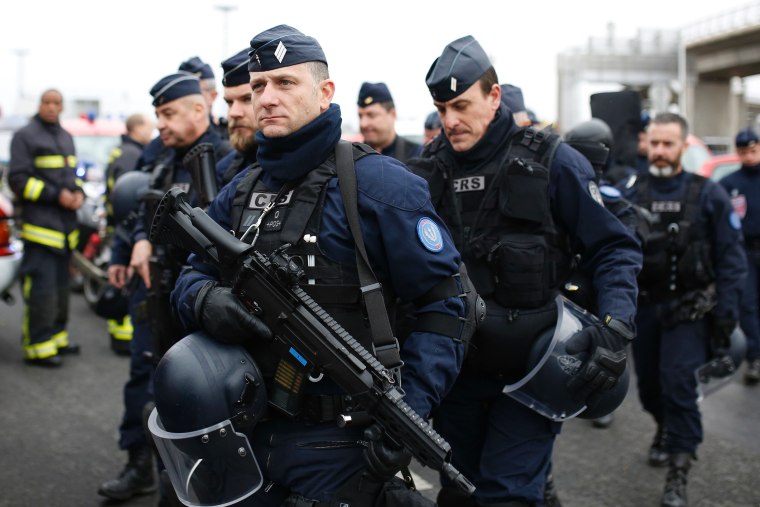PARIS — What started as a lone gunman firing at police on the outskirts of Paris ended in two hours with a suspected Islamic extremist taking a soldier hostage and then being shot dead in France's second-busiest airport, according to a senior official.
Paris prosecutor Francois Molins has described in detail what led up to the onslaught allegedly perpetrated by Ziyed Ben Belgacem, 39, who was killed on Saturday morning in Paris Orly Airport.
Paris-born Belgacem was stopped by three police officers as he drove a white car in Garges-lès-Gonesse, to the north of the city at around 6:30 a.m. (1:30 a.m. ET) on Saturday.
When they asked for his identity papers, the suspect fired a pellet gun at the traffic officers, injuring one, said the prosecutor.
Belgacem, who authorities say had a long criminal record with multiple jail terms for drugs and alcohol, then fled and abandoned his car in Vitry-sur-Seine, to the southeast of the city. A bloodied t-shirt and identification documents were later found inside the car.
He later went into a nearby cafe and threatened to take customers hostage "in the name of Allah" and fired his gun around 12 times, Molins said.
The suspect then commandeered a gray Citroen and headed to Orly airport. It was this second car, which security officials found in the parking lot, that allowed authorities to link the shooting in Garges-lès-Gonesse to the Orly airport attack hours later, said Molins.
In Orly, the escape "became more and more destructive," he added.
At around 8:30 a.m. (3:30 a.m. ET), Belgacem headed inside the airport's southern terminal where he almost immediately encountered a military patrol, the prosecutor said.

The alleged assailant walked up behind the three soldiers, grabbing one. Then he pointed a gun at her head and used her body for cover, said Molin.
"With a pistol in his right hand and a bag over his shoulder, he grabbed (the soldier) with his left arm, made her move backward by three to four meters (yards), positioning her as a shield, and pointed his revolver at her forehead," he said.
According to the soldiers, Belgacem yelled: "Put down your weapons! Put your hands on your head! I am here to die for Allah. Whatever happens, there will be deaths," Molin added.
The assailant tried to wrestle the soldier's rifle away from her during the struggle but her two colleagues shot and killed him before he could fire the military-grade weapon, the prosecutor said. French police said they later found a gas canister, lighter and copy of the Quran inside his backpack.
The attack forced Orly to shut down, sent passengers fleeing in panic and trapped hundreds aboard flights that had just landed.
The prosecutor's office said an autopsy scheduled for Sunday would include tests for drug and alcohol.
Belgacem's brother and a cousin, who were detained soon after the Orly attacks, remained in custody on Sunday. His father was released overnight.
"My son was never a terrorist. He never attended prayer. He drank. But under the effects of alcohol and cannabis, this is where one ends up," the father said in an interview with Europe 1 radio — the station did not give his name.
Despite no one being physically injured apart from the lightly-wounded police traffic officer, the fearsome drama further rattled France, which remains under a state of emergency after attacks in the past two years that have killed 235 people.
